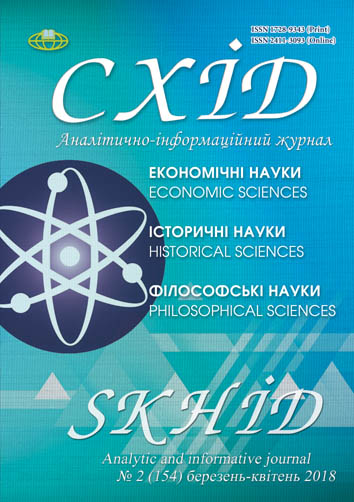Theoretical and conceptual approach to benchmarking on the example of the construction sector of the Republic of Azerbaijan
DOI:
https://doi.org/10.21847/1728-9343.2018.2(154).132801Keywords:
benchmarking, construction industry of Azerbaijan, competitive benchmarking, strategic benchmarkingAbstract
The distinctive correlation of precise boundaries is an essential aspect of social interests in determination of benefit during the course of theoretical and comparative analysis of benchmarking. The relevance of research comprises not only instilling of proprietary aspect of functioning chain that is envisaged to be designated, but also compatibility of consumer-oriented supply factors with the interest. Arguments elimination and reimbursement of complementary expenses have been selected and studied as the purpose of the research. Construction sector of the country was chosen as research object and complex mechanism of benchmarking was analyzed, as well as services provided by "Balfour Beatty" (United Kingdom) and "Alians" (Azerbaijan) companies within the framework of article. The extent of study of the problem encompasses study of time and spatial benefit which cause changes in favor of consumers of services in the sphere of construction. Scientific novelty of the research consists of establishment of distinction between benchmarking and competitiveness studies, revelation of prospect of application of benchmarking in Azerbaijan.
References
Besterfeild, D. H., Besterfeild, C., Besterfeild, G. H., & Besterfeild, M., 2003. Total Quality Management. (3nd ed.). Pearson, USA;
Stapenhurst, T., 2009. The Benchmarking Book. Elsevier Science and Technology Institute, Published in The Boulevard, Langford Lane, Kidlington, Linacre House, Jordan Hill, Oxford OX2 8DP. DOI: 10.1016/b978-0-7506-8905-2.00005.
Anand, G., and Kodali, R., 2008. Benchmarking the benchmarking models. Benchmarking, An international Journal. 15(3): 257-291. DOI: 10.1108/14635770810876593
Attiany, M., 2009. The role of benchmarking in Improving Institutional Performance of the Jordanian Pharmaceutical Firms, PHD, dissertation, Not published, Arab academy for Banking and financial sciences, Amman, Jordan.
Li, S., Ragu-Nathan, B., Ragu-Nathan, T. S., and Rao, S. Subba, 2006. The Impact of Supply Chain Management Practices on Competitive Advantage and Organizational Performance, Omega, 34(2): 107-124. DOI: 10.1016/j.omega.2004.08.002.
Henderson-Smart, C., Winning, T., Gerzina, T., King, S., & Hyde, S., 2006. Benchmarking Learning and Teaching: Developing a Method. Quality Assurance in Education, 14(2): 143-155. DOI: 10.1108/09684880610662024.
Porter, M. E., 2004. Competitive Advantage: creating and sustaining superior performance. New York; London, Free Press.
Thatte, A., 2007. Competitive advantage of a Firm Through Supply Chain Responsiveness and Supply Chain Management Practices, Published PHD Dissertation. University of Toledo.
Luu, V., Kim, S., & Huynh, T., 2008. Improving Project Management Performance of Large Contractors using Benchmarking Approach. International Journal of Project Management, 26(7): 758-769. DOI: 10.1016/j.ijproman.2007.10.002.
Bogetoft, P., 2012. Performance Benchmarking: Measuring and Managing Performance, Management for Professionals. DOI: 10.1007/978-1-4614-6043-5_01.
Zhu, Joe, 2012. Quantitative Models for Performance Evaluation and Benchmarking. International Series in Operations Research & Management Science 213, Springer International Publishing Switzerland. DOI 10.1007/978-3-319-06647-9_2.
Shiuh-Nan, Hwang, Hsuan-Shih, Lee, Zhu, Joe, 2016. Handbook of Operations Analytics Using Data Envelopment Analysis. Worcester, MA, USA. DOI: 10.1007/978-1-4899-7705-2.
Ray, Subhash C., Kumbhakar, Subal C., Dua, Pami, 2015. Benchmarking for Performance Evaluation, Department of Economics, University of Connecticut, Storrs, CT 06269-1063, USA. DOI: 10.1007/978-81-322-2253-8.
Downloads
Published
How to Cite
Issue
Section
License
Copyright (c) 2018 Gyulshan Mustafaeva

This work is licensed under a Creative Commons Attribution-NonCommercial-NoDerivatives 4.0 International License.
1. Authors bear responsibility for the accuracy of facts, quotations, numbers and names used.
2. Manuscripts are not sent back.
3. The publisher does not always agree with the authors' opinion.
4. The authors reserve the right to authorship of the work and pass the first publication right of this work to the journal under the terms of a Creative Commons Attribution Non-Commercial License, which allows others to freely distribute the published research with the obligatory reference to the authors of the original work and the first publication of the work in this journal.
5. The authors have the right to conclude separate supplement agreements that relate to non-exclusive work distribution in the form in which it has been published by the journal (for example, to upload the work to the online storage of the journal or publish it as part of a monograph), provided that the reference to the first publication of the work in this journal is included.

